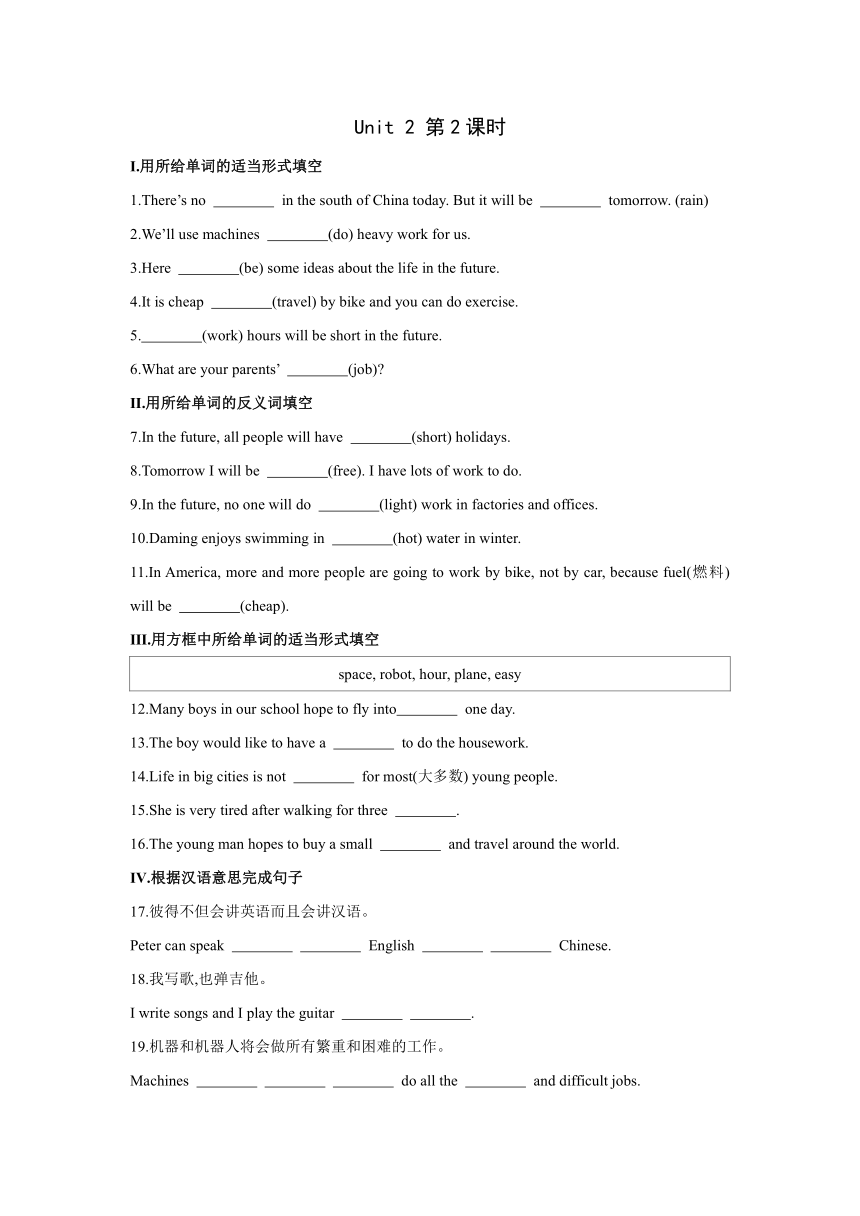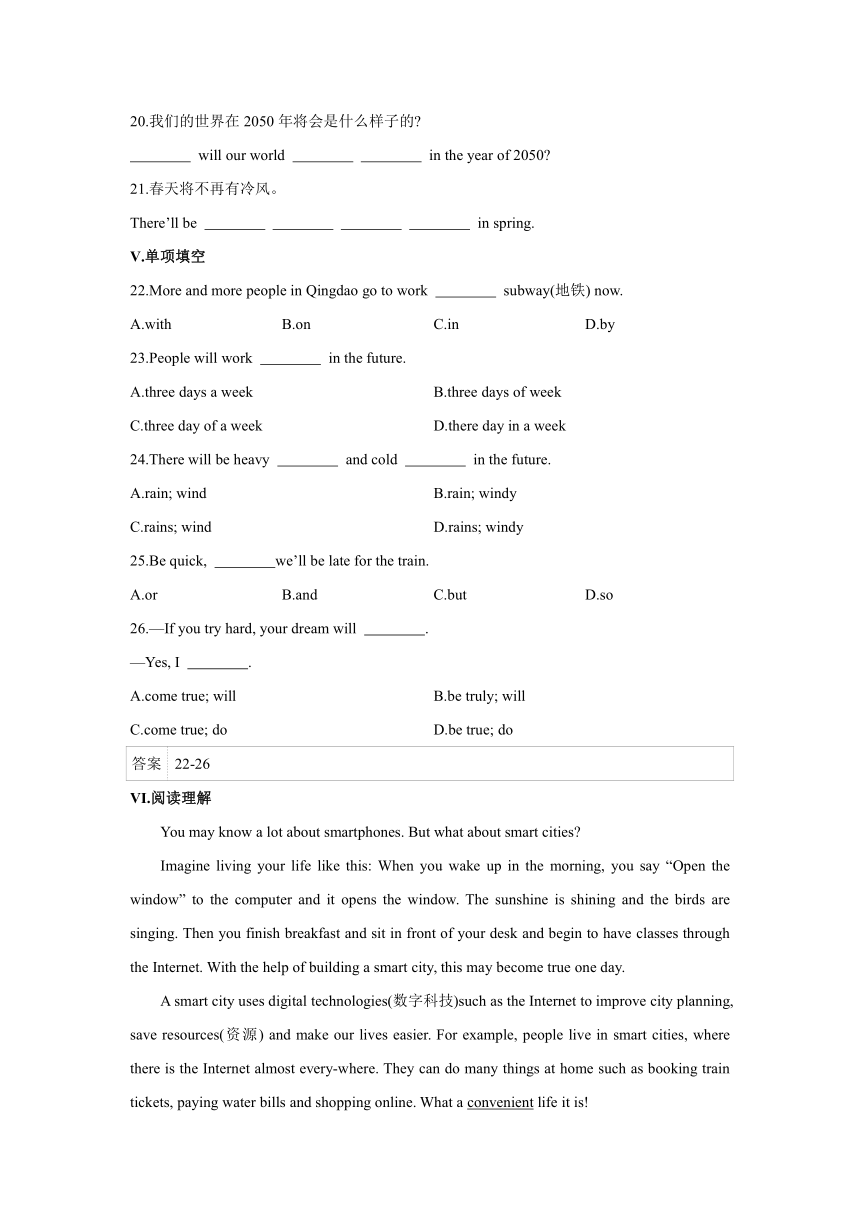Module 4 Life in the future Unit 2 第2课时课课练(word版,含答案)
文档属性
| 名称 | Module 4 Life in the future Unit 2 第2课时课课练(word版,含答案) |  | |
| 格式 | docx | ||
| 文件大小 | 42.1KB | ||
| 资源类型 | 教案 | ||
| 版本资源 | 外研版 | ||
| 科目 | 英语 | ||
| 更新时间 | 2022-07-15 21:26:22 | ||
图片预览


文档简介
Unit 2 第2课时
Ⅰ.用所给单词的适当形式填空
1.There’s no in the south of China today. But it will be tomorrow. (rain)
2.We’ll use machines (do) heavy work for us.
3.Here (be) some ideas about the life in the future.
4.It is cheap (travel) by bike and you can do exercise.
5. (work) hours will be short in the future.
6.What are your parents’ (job)
Ⅱ.用所给单词的反义词填空
7.In the future, all people will have (short) holidays.
8.Tomorrow I will be (free). I have lots of work to do.
9.In the future, no one will do (light) work in factories and offices.
10.Daming enjoys swimming in (hot) water in winter.
11.In America, more and more people are going to work by bike, not by car, because fuel(燃料) will be (cheap).
Ⅲ.用方框中所给单词的适当形式填空
space, robot, hour, plane, easy
12.Many boys in our school hope to fly into one day.
13.The boy would like to have a to do the housework.
14.Life in big cities is not for most(大多数) young people.
15.She is very tired after walking for three .
16.The young man hopes to buy a small and travel around the world.
Ⅳ.根据汉语意思完成句子
17.彼得不但会讲英语而且会讲汉语。
Peter can speak English Chinese.
18.我写歌,也弹吉他。
I write songs and I play the guitar .
19.机器和机器人将会做所有繁重和困难的工作。
Machines do all the and difficult jobs.
20.我们的世界在2050年将会是什么样子的
will our world in the year of 2050
21.春天将不再有冷风。
There’ll be in spring.
Ⅴ.单项填空
22.More and more people in Qingdao go to work subway(地铁) now.
A.with B.on C.in D.by
23.People will work in the future.
A.three days a week B.three days of week
C.three day of a week D.there day in a week
24.There will be heavy and cold in the future.
A.rain; wind B.rain; windy
C.rains; wind D.rains; windy
25.Be quick, we’ll be late for the train.
A.or B.and C.but D.so
26.—If you try hard, your dream will .
—Yes, I .
A.come true; will B.be truly; will
C.come true; do D.be true; do
答案 22-26
Ⅵ.阅读理解
You may know a lot about smartphones. But what about smart cities
Imagine living your life like this: When you wake up in the morning, you say “Open the window” to the computer and it opens the window. The sunshine is shining and the birds are singing. Then you finish breakfast and sit in front of your desk and begin to have classes through the Internet. With the help of building a smart city, this may become true one day.
A smart city uses digital technologies(数字科技)such as the Internet to improve city planning, save resources(资源) and make our lives easier. For example, people live in smart cities, where there is the Internet almost every-where. They can do many things at home such as booking train tickets, paying water bills and shopping online. What a convenient life it is!
Now China is making some cities smarter. For example, Guiyang is going to build free Wi-Fi in the whole city. Tianjin plans to start a smart city programme to solve traffic problems. Guangzhou is creating a smart city, so everyone in the city should play a role in creating a smart city.
27.Which city is planning to start a smart city programme to solve traffic problems
A.Guiyang. B.Tianjin. C.Guangzhou. D.Beijing.
28.According to the passage, we can do the following things through the Internet at home EXCEPT .
A.booking train tickets B.having classes
C.paying water bills D.having breakfast
29.The underlined word “convenient” in the passage means .
A.difficult B.easy C.lazy D.busy
30.What will the life be like in the future
A.People in Guiyang can pay for Wi-Fi in the whole city.
B.A smart city with digital technologies will use more resources.
C.People can open the windows through the computer.
D.Computers can make the sun shine and birds sing.
31.The passage mainly tells us .
A.the smart cities B.the future life
C.digital technologies D.the smartphones
答案 27-31
答案
【第4课时】
Ⅰ.1.rain; rainy 2.to do 3.are 4.to travel 5.Working 6.jobs
Ⅱ.7.long 8.busy 9.heavy 10.cold 11.expensive
Ⅲ.12.space 13.robot 14.easy 15.hours 16.plane
Ⅳ.17.not only; but also 18.as well
19.and robots will; heavy
20.What; be like 21.no more cold wind
Ⅴ.22—26 DAAAA
Ⅵ.27.B 根据最后一段中的“Tianjin plans to start a smart city programme to solve traffic problems.”可知,天津计划开启智能城市解决交通问题。
28.D 根据第三段中的“They can do many things at home such as booking train tickets, paying water bills and shopping online.”可知,通过互联网,人们可以在家买火车票、付水费和在线购物,但不包括吃早餐。
29.B difficult意为“困难的”;easy意为“容易的”;lazy意为“懒惰的”;busy意为“忙碌的”。根据第三段中的“They can do many things at home such as booking train tickets, paying water bills and shopping online.”可知,通过互联网,人们可以不出门在家做很多事情,因此生活会变得很“容易”。
30.C 根据第二段中的“When you wake up in the morning, you say ’Open the window’ to the computer and it opens the window.”可知,在将来的智能生活当中,我们可以通过口头命令电脑打开窗户。
31.A 根据第一段“You may know a lot about smartphones. But what about smart cities ”及下文内容可知,文章主要给我们介绍了智慧城市。
Ⅰ.用所给单词的适当形式填空
1.There’s no in the south of China today. But it will be tomorrow. (rain)
2.We’ll use machines (do) heavy work for us.
3.Here (be) some ideas about the life in the future.
4.It is cheap (travel) by bike and you can do exercise.
5. (work) hours will be short in the future.
6.What are your parents’ (job)
Ⅱ.用所给单词的反义词填空
7.In the future, all people will have (short) holidays.
8.Tomorrow I will be (free). I have lots of work to do.
9.In the future, no one will do (light) work in factories and offices.
10.Daming enjoys swimming in (hot) water in winter.
11.In America, more and more people are going to work by bike, not by car, because fuel(燃料) will be (cheap).
Ⅲ.用方框中所给单词的适当形式填空
space, robot, hour, plane, easy
12.Many boys in our school hope to fly into one day.
13.The boy would like to have a to do the housework.
14.Life in big cities is not for most(大多数) young people.
15.She is very tired after walking for three .
16.The young man hopes to buy a small and travel around the world.
Ⅳ.根据汉语意思完成句子
17.彼得不但会讲英语而且会讲汉语。
Peter can speak English Chinese.
18.我写歌,也弹吉他。
I write songs and I play the guitar .
19.机器和机器人将会做所有繁重和困难的工作。
Machines do all the and difficult jobs.
20.我们的世界在2050年将会是什么样子的
will our world in the year of 2050
21.春天将不再有冷风。
There’ll be in spring.
Ⅴ.单项填空
22.More and more people in Qingdao go to work subway(地铁) now.
A.with B.on C.in D.by
23.People will work in the future.
A.three days a week B.three days of week
C.three day of a week D.there day in a week
24.There will be heavy and cold in the future.
A.rain; wind B.rain; windy
C.rains; wind D.rains; windy
25.Be quick, we’ll be late for the train.
A.or B.and C.but D.so
26.—If you try hard, your dream will .
—Yes, I .
A.come true; will B.be truly; will
C.come true; do D.be true; do
答案 22-26
Ⅵ.阅读理解
You may know a lot about smartphones. But what about smart cities
Imagine living your life like this: When you wake up in the morning, you say “Open the window” to the computer and it opens the window. The sunshine is shining and the birds are singing. Then you finish breakfast and sit in front of your desk and begin to have classes through the Internet. With the help of building a smart city, this may become true one day.
A smart city uses digital technologies(数字科技)such as the Internet to improve city planning, save resources(资源) and make our lives easier. For example, people live in smart cities, where there is the Internet almost every-where. They can do many things at home such as booking train tickets, paying water bills and shopping online. What a convenient life it is!
Now China is making some cities smarter. For example, Guiyang is going to build free Wi-Fi in the whole city. Tianjin plans to start a smart city programme to solve traffic problems. Guangzhou is creating a smart city, so everyone in the city should play a role in creating a smart city.
27.Which city is planning to start a smart city programme to solve traffic problems
A.Guiyang. B.Tianjin. C.Guangzhou. D.Beijing.
28.According to the passage, we can do the following things through the Internet at home EXCEPT .
A.booking train tickets B.having classes
C.paying water bills D.having breakfast
29.The underlined word “convenient” in the passage means .
A.difficult B.easy C.lazy D.busy
30.What will the life be like in the future
A.People in Guiyang can pay for Wi-Fi in the whole city.
B.A smart city with digital technologies will use more resources.
C.People can open the windows through the computer.
D.Computers can make the sun shine and birds sing.
31.The passage mainly tells us .
A.the smart cities B.the future life
C.digital technologies D.the smartphones
答案 27-31
答案
【第4课时】
Ⅰ.1.rain; rainy 2.to do 3.are 4.to travel 5.Working 6.jobs
Ⅱ.7.long 8.busy 9.heavy 10.cold 11.expensive
Ⅲ.12.space 13.robot 14.easy 15.hours 16.plane
Ⅳ.17.not only; but also 18.as well
19.and robots will; heavy
20.What; be like 21.no more cold wind
Ⅴ.22—26 DAAAA
Ⅵ.27.B 根据最后一段中的“Tianjin plans to start a smart city programme to solve traffic problems.”可知,天津计划开启智能城市解决交通问题。
28.D 根据第三段中的“They can do many things at home such as booking train tickets, paying water bills and shopping online.”可知,通过互联网,人们可以在家买火车票、付水费和在线购物,但不包括吃早餐。
29.B difficult意为“困难的”;easy意为“容易的”;lazy意为“懒惰的”;busy意为“忙碌的”。根据第三段中的“They can do many things at home such as booking train tickets, paying water bills and shopping online.”可知,通过互联网,人们可以不出门在家做很多事情,因此生活会变得很“容易”。
30.C 根据第二段中的“When you wake up in the morning, you say ’Open the window’ to the computer and it opens the window.”可知,在将来的智能生活当中,我们可以通过口头命令电脑打开窗户。
31.A 根据第一段“You may know a lot about smartphones. But what about smart cities ”及下文内容可知,文章主要给我们介绍了智慧城市。
同课章节目录
- Module 1 Lost and found
- Unit 1 Whose bag is this?
- Unit 2 Are they yours?
- Unit 3 Language in use
- Module 2 What can you do ?
- Unit 1 I can play the piano
- Unit 2 I can run really fast
- Unit 3 Language in use
- Module 3 Making plans
- Unit 1 What are you going to do at the weekends?
- Unit 2 We're going to cheer the players.
- Unit 3 Language in use
- Module 4 Life in the future
- Unit 1 Everyone will study at home
- Unit 2 Every family will have a small plane.
- Unit 3 Language in use
- Module 5 Shopping
- Unit 1 What can I do for you?
- Unit 2 You can buy everything on the Internet
- Unit 3 Language in use
- Module 6 Around town
- Unit 1 Could you tell me how to get to the Nationa
- Unit 2 The London Eye is on your right.
- Unit 3 Language in use
- Revision module A
- Module 7 My past life
- Unit 1 I was born in a small village.
- Unit 2 I was born in Quincy.
- Unit 3 Language in use
- Module 8 Story time
- Unit 1 Once upon a time….
- Unit 2 Goldilocks hurried out of the house.
- Unit 3 Language in use
- Module 9 Life history
- Unit 1 He left school and began work at the age of
- Unit 2 He decided to be an actor.
- Unit 3 Language in use
- Module 10 A holiday journey
- Unit 1 What did you do?
- Unit 2 This morning we took a walk.
- Unit 3 Language in use
- Module 11 Body language
- Unit 1 They touch noses!
- Unit 2 Here are some ways to welcome them.
- Unit 3 Language in use
- Module 12 Western music
- Unit 1 It's so beautiful!
- Unit 2 Vienna is the centre of European classical
- Unit 3 Language in use
- Revision module B
